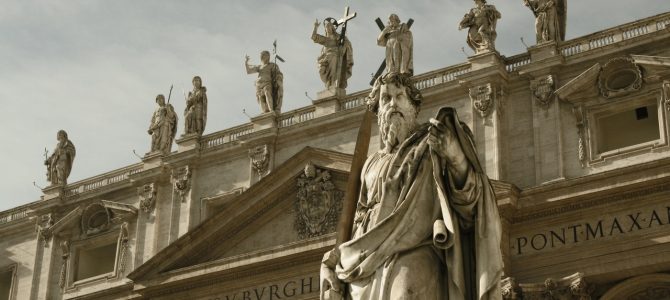
From “The Spartan Regime: Its Character, Origins, and Grand Strategy,” by Paul A.Rahe, published by Yale University Press in September 2016. Reproduced by permission.
Herodotus once described Sparta as a kósmos, and Plutarch later followed his lead. It was not always such. But, in the course of the archaic period, with the establishment there of the condition of good order and lawfulness that the ancients from Homer, Hesiod, Tyrtaeus, and Alcman on called eunomía, this is precisely what Lacedaemon became: a meticulously, more or less coherently ordered whole—apt to elicit admiration.1
As a ruling order, the Spartiates constituted a seigneurial class blessed with leisure and devoted to a common way of life centered on the fostering of certain manly virtues. They made music together, these Spartans. There was very little that they did alone. Together they sang and they danced, they worked out, they competed in sports, they boxed and wrestled, they hunted, they dined, they cracked jokes, and they took their repose.
Theirs was a rough-and-tumble world, but it was not bereft of refinement and it was not characterized by an ethos of grim austerity, as some have supposed.2 Theirs was, in fact, a life of great privilege and pleasure enlivened by a spirit of rivalry as fierce as it was friendly. The manner in which they mixed music with gymnastic and fellowship with competition caused them to be credited with eudaımonía—the happiness and success that everyone craved—and it made them the envy of Hellas.3 This gentlemanly modus vivendi had, however, one precondition: Lacedaemon’s continued dominion over Laconia and Messenia and its brutal subjection of the helots on both sides of Mount Taygetus.
A Delicate, All-Encompassing Balancing Act
The grand strategy the Lacedaemonians gradually articulated in defense of the way of life they so cherished was all-encompassing, as successful grand strategies often are.4 Of necessity, it had domestic consequences on a considerable scale. As we have seen, its dictates go a long way toward explaining the Spartans’ aversion to commerce; their practice of infanticide; their provision for every citizen of an equal allotment of land and of servants to work it; the city’s sumptuary laws; their sharing of slaves, horses, and hounds; their intense piety; the subjection of their male offspring to an elaborate system of education and indoctrination; their use of music and poetry to instill a civic spirit; their practice of pederasty; the rigors and discipline to which they habitually subjected themselves; and, of course, their constant preparation for war.
It accounts as well for the articulation over time within Lacedaemon of a mixed regime graced with elaborate balances and checks. To sustain their dominion in Laconia and Messenia and to maintain the helots in bondage, the Spartans had to eschew faction; foster among themselves the same opinions, passions, and interests; and employ–above all, in times of strain–procedures, recognized as fair and just, by which to reach a stable political consensus consistent with the dictates of prudence.
Not surprisingly, this grand strategy had serious consequences for Lacedaemon’s posture in the international sphere as well. The Spartans’ perch was precarious. The Corinthian leader who compared their polity with a stream was right. Rivers really do grow in strength as other streams empty into them, and the like could be said of the Lacedaemonians: “There, in the place where they emerge, they are alone; but as they continue and gather cities under their control, they become more numerous and harder to fight.”5
Even when their population was at its height, the Spartans were few in number, and the territory they ruled was comparatively vast. The underlings they exploited were astonishingly numerous and apt to be rebellious. In Messenia, if not also in Laconia, the helots saw themselves as a people in bondage, and geography did not favor the haughty men who kept them in that condition. The Spartans could look to the períoıkoı for support, and this they did. But the latter were not all that numerous, and it was never entirely certain that they could be relied on. They, too, had to be overawed. In the long run, the Spartans could not sustain their way of life if they did not recruit allies outside their stronghold in the southern Peloponnesus.
A Fatal Flaw in the Grand Plan
As we have seen, it took the Lacedaemonians some time to sort out in full the implications of their position. Early on, at least, trial and error governed their approach to the formulation of policy. But by the middle of the sixth century, Chilon and others had come to recognize that, if their compatriots did not find some way to leverage the manpower of their neighbors, they would themselves someday come a-cropper.
And so the Spartiates reluctantly abandoned the dream of further expansion, repositioned themselves as defenders of Arcadian autonomy, and presented themselves to the Hellenic world as the scourge of tyranny, the champions of liberty, the friends of oligarchy, and the heirs of Agamemnon. It was under this banner that they rearranged the affairs of their fellow Peloponnesians to their liking and founded a grand alliance designed to keep their Argive enemies out, the helots down, and the Arcadians, above all others, in.
Taken as a whole, the grand strategy of classical Lacedaemon was brilliantly designed for the purpose it was intended to serve. It had, however, one grave defect. It presupposed that for all practical purposes, under Sparta’s hegemony, the Peloponnesus was a world unto itself—which, of course, it was . . . at the time that this strategy was first formulated.6 If, however, there ever came a moment when a power equal to or greater than Lacedaemon appeared in force—or even threatened to appear—at or near the entrance to that great peninsula, the Spartans would have to rethink this strategy and recast it to meet an unanticipated challenge.
It was in or quite soon after the mid-540s that such a prospect first loomed in the distance on the horizon. As we shall see in the sequel to this volume, although the Spartans were by no means slow to take note of the challenge they faced, they were exceedingly cautious in the mode of proceeding that they then adopted.









